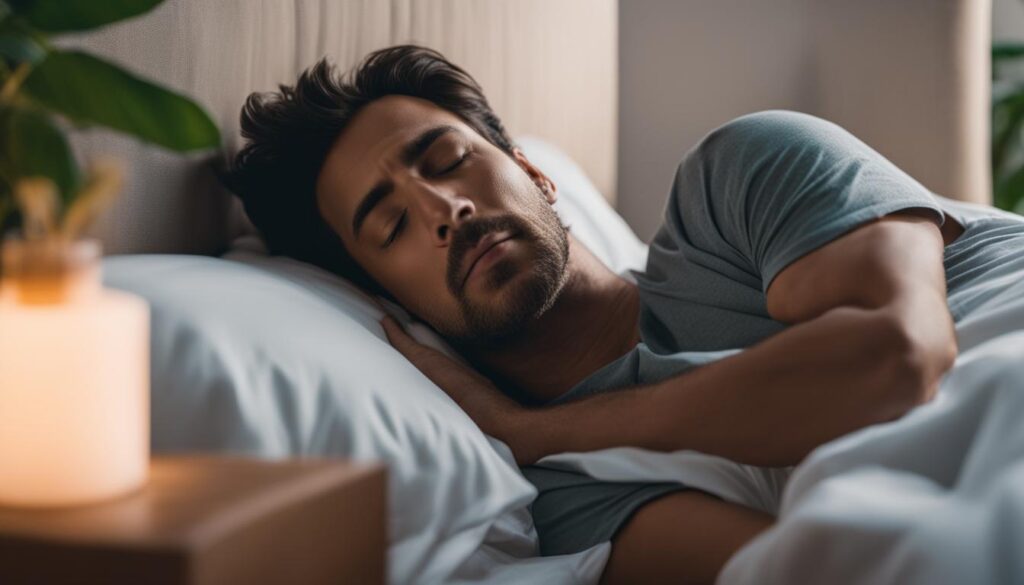We may earn money or products from the companies mentioned in this post.
Sleep is a vital component of overall health and wellbeing, and achieving quality sleep is especially important for men. However, men face specific challenges when it comes to getting adequate rest. From work-related stress to hormonal changes, these factors can negatively impact sleep quality and quantity. In this Sleep Optimization for Men Guide, we will explore the importance of prioritizing sleep and provide practical tips and solutions to help men achieve better rest and improve their overall health.
Key Takeaways
- Quality sleep is crucial for men’s overall health and wellbeing.
- Men face specific challenges in getting adequate rest.
- By prioritizing sleep hygiene and making lifestyle changes, men can improve their sleep quality.
- Common sleep disorders can also impact men’s sleep, and seeking professional help may be necessary.
- By implementing the tips and strategies provided, men can unlock better rest and enjoy the benefits of improved sleep.
Understanding Sleep: Basics, Patterns, and Importance
Sleep is a vital aspect of overall health and wellbeing, especially for men. Quality sleep is essential for physical, mental, and emotional health, as well as productivity and cognitive function.
The sleep cycle consists of four to five stages, each with a unique pattern of brain activity and physiological changes. The first stage is light sleep, followed by stages of progressively deeper sleep. The final stage, REM (rapid eye movement) sleep, is when the brain is most active, and most dreaming occurs.
Maintaining a regular sleep pattern is crucial in promoting sleep quality for men. A consistent sleep schedule helps regulate the body’s internal clock, resulting in better sleep quality and overall wellbeing.
Sleep Patterns for Men
Research has shown that men have different sleep patterns than women, with men spending more time in deep sleep and less time in REM sleep. Men’s sleep cycles are also shorter, averaging around 90 minutes, while women’s cycles are closer to 100 minutes.
It’s essential to prioritize sleep quality for men, as poor sleep quality can lead to a variety of negative consequences. These can include fatigue, decreased productivity, and increased risk of chronic diseases such as obesity, diabetes, and depression.
Ensuring that men get adequate sleep and maintain a regular sleep pattern is vital for promoting optimal health.
Common Sleep Disorders for Men
Sleep disorders are a common issue that affects men. These conditions can have a significant impact on mental and physical health. Here are some of the most common sleep disorders that men may experience:
Sleep Apnea
Sleep apnea is a sleep disorder characterized by interrupted breathing during sleep. It’s common in men and can lead to fatigue, headaches, and other health issues. There are different types of sleep apnea, but the most common is obstructive sleep apnea (OSA). This occurs when the airway becomes blocked during sleep, causing the person to stop breathing temporarily.
Insomnia
Insomnia is a disorder in which individuals have difficulty falling asleep or staying asleep. Men who experience insomnia may feel fatigued during the day, have difficulty concentrating, and experience mood changes. Insomnia can be caused by a variety of factors including stress, anxiety, and depression.
Restless Leg Syndrome (RLS)
Restless leg syndrome is a neurological disorder characterized by an uncomfortable sensation in the legs resulting in the irresistible urge to move them. This can cause sleep disturbances and result in daytime fatigue. RLS may be caused by genetics, pregnancy, or iron deficiency.
Narcolepsy
Narcolepsy is a disorder in which individuals experience excessive daytime sleepiness, and may even fall asleep suddenly during the day without warning. Men who have narcolepsy may also experience sleep paralysis, hallucinations, and disrupted nighttime sleep. The exact cause of narcolepsy is unknown, but genetics may play a role.
Periodic Limb Movement Disorder (PLMD)
Periodic Limb Movement Disorder is a sleep disorder characterized by involuntary muscle movements, usually in the legs, during sleep. This can cause frequent awakenings and result in daytime fatigue. Men who experience PLMD may also have Restless Leg Syndrome. The causes of PLMD are not yet fully understood, but it may be related to genetic factors or an underlying medical condition.
If you experience symptoms of any of these sleep disorders, it’s important to speak to a healthcare professional for an accurate diagnosis and treatment plan. Treating sleep disorders can lead to better sleep quality, improved mental and physical health, and a better overall quality of life.
Sleep Hygiene: Tips for Men
Good sleep hygiene means adopting habits that promote better sleep. Here are some tips and strategies to help men improve their sleep quality and quantity:
- Create a Sleep-Conducive Environment: Keep your bedroom dark, quiet, and cool. Use blackout curtains or an eye mask if necessary. Consider investing in a comfortable mattress and pillows.
- Establish a Regular Sleep Schedule: Go to bed and wake up at the same time every day, even on weekends. This helps establish your body’s natural sleep-wake cycle.
- Avoid Stimulants: Avoid caffeine and nicotine for several hours before bedtime. Avoid alcohol and large meals before bed as well.
- Unplug from Electronics: Turn off electronic devices at least an hour before bed. The blue light emitted by screens can disrupt your body’s production of the sleep hormone melatonin.
- Create a Bedtime Routine: Establish a relaxing bedtime routine to signal to your body that it’s time to sleep. This could include taking a warm bath, reading, or practicing relaxation techniques.
- Exercise Regularly: Regular exercise can improve sleep quality and help you fall asleep faster. Just avoid vigorous exercise close to bedtime, as it can have the opposite effect.
- Manage Stress: Stress and anxiety can interfere with sleep. Find healthy ways to manage stress, such as meditation, deep breathing, or yoga.
By implementing these tips, men can improve their sleep hygiene and get the rest they need for optimal health and wellbeing.
Consequences of Sleep Deprivation in Men
Sleep deprivation is a common problem that affects many men. It occurs when a person does not get enough sleep and can lead to a variety of negative consequences.
Decreased Cognitive Function
Sleep deprivation has been shown to impair cognitive function, including memory, attention, and decision-making. This can have a significant impact on daily life, including work performance and personal relationships.
Reduced Immune System
A lack of sleep can also weaken the immune system, making it harder for the body to fight off illness and infection. This can lead to an increased risk of developing chronic health problems, such as heart disease and diabetes.
Increased Risk of Chronic Diseases
Studies have found that sleep deprivation is associated with an increased risk of chronic diseases, such as obesity, high blood pressure, and depression. These conditions can have a significant impact on a man’s overall health and wellbeing, making it important to prioritize adequate sleep.
“Sleep deprivation is associated with an increased risk of chronic diseases, such as obesity, high blood pressure, and depression.”
Importance of Prioritizing Adequate Sleep
Given the negative consequences of sleep deprivation, it is crucial for men to prioritize adequate sleep. This may include making changes to their sleep environment, establishing a regular bedtime routine, and addressing any underlying sleep disorders. By taking steps to improve sleep quality, men can improve their overall health and wellbeing.
Sleep Solutions for Men: Lifestyle Changes and Remedies
Men who struggle with sleep have several options for improving the quality of their rest. In addition to establishing good sleep hygiene practices, there are lifestyle changes and natural remedies that can promote better sleep. Here are some strategies to consider:
- Exercise: Regular exercise helps reduce stress and promotes better sleep. Aim for at least 30 minutes of moderate physical activity each day, but be sure to finish exercise at least a couple of hours before bedtime to avoid overstimulation.
- Diet: Eating a healthy diet can positively impact sleep. Avoid large meals before bedtime and limit caffeine and alcohol intake, as both can interfere with sleep quality.
- Stress Management: High levels of stress can disrupt sleep patterns. Consider practicing relaxation techniques, like deep breathing, meditation, or yoga, to reduce stress and promote relaxation before bedtime.
- Natural Remedies: Some men find natural remedies to be helpful in promoting better sleep. These can include herbal teas, like chamomile or valerian root, or aromatherapy with essential oils, like lavender or bergamot.
It’s important to note that these remedies may not work for everyone, and it’s always a good idea to consult with a healthcare provider before trying any new sleep solutions.
Considerations for Sleep Medications
Sleep medications can be useful for some men who struggle with insomnia or other sleep disorders, but they should be used with caution. Some sleep medications can be habit-forming and may have side effects, including dizziness and grogginess the next day. It’s important to talk to a healthcare provider about the benefits and risks of sleep medications before starting any new medication.
The Bottom Line
Sleep optimization is critical for men’s overall health and well-being. By implementing good sleep hygiene practices, making lifestyle changes, and considering natural remedies or medications under medical supervision, men can improve their sleep quality and reap the many benefits that come with better rest.
Sleep Disorders for Men: When to Consult a Doctor
While implementing lifestyle changes and natural remedies can help improve sleep quality for men, there are instances where seeking professional help is necessary. Sleep disorders can significantly impact one’s overall health and wellbeing. Below are some signs that men should consult a doctor:
- Loud snoring: Snoring can be a sign of sleep apnea, a potentially serious sleep disorder where breathing repeatedly stops and starts during sleep.
- Difficulty falling or staying asleep: Chronic insomnia may require medical intervention in addition to lifestyle changes.
- Excessive daytime sleepiness: This may be a sign of a sleep disorder, such as narcolepsy or sleep apnea.
- Nighttime movements: Restless leg syndrome or periodic limb movement disorder may cause frequent leg movements during sleep and disrupt sleeping patterns.
It’s important to discuss any sleep problems with a healthcare provider who can diagnose a sleep disorder and provide appropriate treatment options. Treatment may include medication, therapy, or the use of a Continuous Positive Airway Pressure (CPAP) machine for sleep apnea.
Don’t let sleep disorders interfere with your health and wellbeing. Consult with a healthcare provider if you experience any persistent sleep problems.
Conclusion
Getting adequate sleep is essential for men’s overall health and wellbeing. In this guide, we’ve covered the importance of sleep optimization, the basics of sleep patterns, and the negative consequences of sleep deprivation for men’s physical and mental health.
We’ve also covered common sleep disorders for men, including sleep apnea, insomnia, and restless leg syndrome. We provided practical tips and strategies for improving sleep hygiene, such as creating a relaxing sleep environment and establishing a bedtime routine to manage digital distractions.
Additionally, we discussed lifestyle changes and natural remedies that men can use to improve their sleep quality. However, it’s important to note that some sleep disorders may require professional treatment, and we encourage men to seek medical attention if they experience persistent sleep problems.
Overall, prioritizing sleep optimization is essential for men to maintain their overall health and wellbeing. By implementing the tips and strategies provided in this guide, men can improve their sleep quality and reap the benefits of better rest.
FAQ
What is sleep optimization for men?
Sleep optimization for men refers to adopting healthy habits and practices that promote better sleep quality. It involves creating a sleep routine, managing sleep disorders, and implementing lifestyle changes to improve sleep patterns.
Why is sleep important for men’s health?
Sleep is crucial for men’s health as it plays a vital role in maintaining overall wellbeing. Quality sleep supports immune function, promotes mental and physical performance, aids hormonal balance, and helps prevent chronic diseases.
What are common sleep disorders that affect men?
Common sleep disorders that affect men include sleep apnea, insomnia, restless leg syndrome, and snoring. These disorders can disrupt sleep patterns and lead to daytime sleepiness, fatigue, and other health complications.
What are some tips to improve sleep hygiene for men?
To improve sleep hygiene, men can create a regular sleep schedule, establish a relaxing bedtime routine, create a comfortable sleep environment, limit caffeine and alcohol intake, and avoid electronic devices before bed.
What are the consequences of sleep deprivation in men?
Sleep deprivation in men can negatively impact cognitive function, immune system health, and increase the risk of developing conditions like obesity, diabetes, and cardiovascular diseases. It can also affect mood, productivity, and overall quality of life.
What are some lifestyle changes and remedies for better sleep?
Lifestyle changes and remedies for better sleep include regular exercise, maintaining a healthy diet, managing stress levels, practicing relaxation techniques, using natural sleep aids like herbal supplements or essential oils, and creating a comfortable sleep environment.
When should men consult a doctor for sleep problems?
Men should consider consulting a healthcare provider if they experience persistent or severe sleep problems, such as chronic insomnia, loud snoring, excessive daytime sleepiness, or symptoms of sleep apnea. A doctor can diagnose sleep disorders and recommend appropriate treatments.
Affiliate Disclosure: This post may contain affiliate links. If you purchase through our link, we may receive a small commission, but at no additional cost to you. For more information, please see our Disclosure statement.



